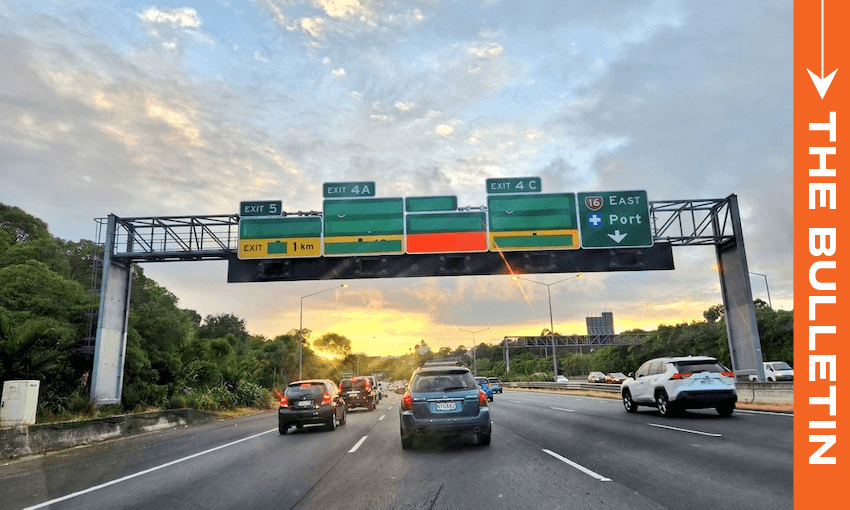Wayne Brown is a fan of congestion pricing and National is too. So when will Auckland drivers start paying to use the city’s busiest roads, asks Catherine McGregor in this excerpt from The Bulletin, The Spinoff’s morning news round-up. To receive The Bulletin in full each weekday, sign up here.
Wayne Brown goes to war against congestion
Of all the things Aucklanders didn’t have on their 2023 bingo cards, mayor Wayne Brown becoming a hero to leftie-urbanist Twitter is likely way up there. But that’s where we’re at with Brown’s vocal support for congestion pricing – or “time of use” charges, as he prefers to call them – on some of Auckland’s roads. He wants to see charges of $3.50 and $5 a trip for peak-time travel on SH1 between Penrose and Greenlane and SH16 between Lincoln Road and Te Atatū Road, and on Thursday the council’s transport committee voted to proceed. The removal of the regional fuel tax, a National election campaign policy which the mayor says would leave a close to $2 billion hole in the council’s budget, makes congestion pricing a pressing concern, Brown says. When asked by Heather du Plessis Allan about the financial impact on parents, Brown replied that “it isn’t the law you have to get to school in a BMW”, later adding that there was no point building new roads when the existing ones were “empty most of the time”. It was all music to the ears of many on Twitter. Said one: “To the anon person in the ear of Wayne Brown on urbanist policies: I see you and honour you for your great work.”
Equity a key issue
The problems of BMW-driving parents aside, introducing time-of-use charges would bring with them significant equity challenges. Issues raised by councillors yesterday included the effects on disabled people and those on lower-paid jobs without the ability to negotiate time of work or to work from home. Brown says low-income earners, Gold Card holders and motorcycles could be considered for exemptions or discounts. A Helen Clark Foundation report on the fair implementation of congestion pricing – which encompasses both “always on” and time-of-use charges – last year voiced support for its introduction in the Auckland CBD but warned that “a charge outside the CBD is unlikely to be justified due to the lack of public and active transport alternatives”.
A ‘fairer’ kind of road charge attracts bipartisan support
One of the more surprising aspects of congestion charging is the extent of its bipartisan appeal. National is broadly supportive, though transport spokesperson Simeon Brown has said it could take two to three years to introduce congestion charging through an act of parliament – a much longer timeframe than Mayor Brown is proposing. Northern Infrastructure Forum chair Simon Bridges is a big fan (paywalled) and even Kiwiblog’s David Farrar says they’re a fairer form of user pays than a broad-base road user charge. “It is the peak time congestion that requires additional roads and lanes, so motorists should pay more for using a road at peak times.” Despite the bipartisan support, the Labour government chose not to proceed with the legislation, Oliver Lewis reports Businessdesk (paywalled). The draft legislation could have been introduced into the house by April 2023, according to a timeline released to Lewis under an OIA, but both Michael Wood and his successor David Parker decided against it.
Tauranga also considering congestion pricing
Auckland is not the only city grappling with the congestion charging question. Tauranga council is considering them as a replacement for current toll roads around the city, in a scheme that could see motorists pay $3 for a peak-hour 6km trip from Mount Maunganui to the city centre. In one potential scenario being considered, commuting between the CBD and Pāpāmoa in peak hours five days a week could cost more than $2400 a year, the Herald’s Kiri Gillespie reports. Congestion charging could also impact residents of some outer Tauranga suburbs who do not have a local supermarket and would have no non-priced route to one in town. For all their drawbacks, road charges are absolutely necessary, a Waka Kotahi staff member told city commissioners this week. Without them, future Tauranga residents would experience “economic catastrophe and terrible wellbeing”, he said.
